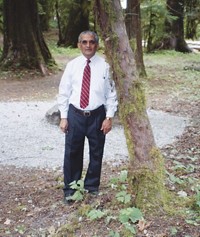Advertisement
Grab your lab coat. Let's get started
Welcome!
Welcome!
Create an account below to get 6 C&EN articles per month, receive newsletters and more - all free.
It seems this is your first time logging in online. Please enter the following information to continue.
As an ACS member you automatically get access to this site. All we need is few more details to create your reading experience.
Not you? Sign in with a different account.
Not you? Sign in with a different account.
ERROR 1
ERROR 1
ERROR 2
ERROR 2
ERROR 2
ERROR 2
ERROR 2
Password and Confirm password must match.
If you have an ACS member number, please enter it here so we can link this account to your membership. (optional)
ERROR 2
ACS values your privacy. By submitting your information, you are gaining access to C&EN and subscribing to our weekly newsletter. We use the information you provide to make your reading experience better, and we will never sell your data to third party members.
Analytical Chemistry
Pioneer
Undersea Treasure Hunter
by Bethany Halford
October 24, 2011
| A version of this story appeared in
Volume 89, Issue 43
The bryostatins, and many other natural products, might never have been mined from the sea for their disease-fighting compounds if not for the efforts of George R. Pettit. Known to his friends as Bob, Pettit has been searching the sea for cancer-fighting compounds for more than 40 years, as a chemistry professor at Arizona State University (ASU) and director of the ASU Cancer Research Institute, a position he still holds.
It was a convergence of events in his childhood and teenage years, Pettit tells C&EN, that led him to cast his eye toward the ocean to seek cancer cures. Pettit grew up on the Jersey Shore, just half a mile from the ocean, and spent much of his childhood exploring the interesting invertebrates that lived there.
At age 15, Pettit began working in a medical center lab in Monmouth County, N.J. As part of his duties, he had to assist the hospital pathologist in doing postmortem exams, where he saw the ravages of cancer firsthand. “It made such a shocking impression on me that I still haven’t recovered from it,” he says.
Pettit began thinking of all those squishy creatures he had played with at the beach as a child. Physically, they seemed so vulnerable. And yet they’d managed to survive and evolve over billions of years without being gobbled up by predators. Pettit reckoned their chemical defenses must therefore be highly evolved, and he wondered whether those same defenses might also fight cancer. “I always thought, even when I was a kid, that naturally occurring material—plants, animals, microorganisms—would really be the best place to look for drugs,” he recalls.
In 1965, Pettit was lured away from his position at the University of Maine, where he’d explored natural products from fungi, plants, and arthropods, and joined the faculty at ASU. Working in collaboration with the National Cancer Institute (NCI), Pettit began what he describes as the first worldwide exploration of marine invertebrates as new sources for anticancer drugs.
In the first 25 years of this research effort, he never once took a vacation, Pettit says. All his family trips were to sites where he could collect specimens. And he often enlisted his five children to help him collect underwater creatures. “They were our expeditionary force,” he jokes.
Over the years, Pettit and his colleagues have collected some 14,000 specimens from the sea and elsewhere. And from them he has identified myriad tumor-fighting natural products—the bryostatins, the combretastatins, the spongistatins, and the dolastatins, to name just a few. A synthetic dolostatin analog, named monomethyl auristatin E, recently received approval from the Food & Drug Administration to treat two types of lymphoma as part of a drug-antibody conjugate, named Adcetris, which is marketed by Seattle Genetics and Takeda Pharmaceutical (C&EN, July 25, page 10).
“Pettit has been an outstanding leader in natural products research, particularly in the search for new drugs for the treatment of various types of cancer,” says longtime Journal of Natural Products Associate Editor Richard G. Powell. “The contributions of Pettit and his research group to this area of research since the early 1960s have been quite numerous, the research meticulous, and under his leadership the group has been outstandingly successful in the discovery of new compounds useful, or potentially useful, for cancer chemotherapy.”
“He can truly be regarded as one of the great pioneers in natural products drug discovery who was among the first to explore the realm of marine organisms as a source of potential antitumor agents,” adds Gordon M. Cragg, a National Institutes of Health special volunteer with NCI’s Natural Products Branch. “Pettit is an outstanding and resourceful scientist totally committed to improving the treatment and quality of life of cancer patients worldwide.”





Join the conversation
Contact the reporter
Submit a Letter to the Editor for publication
Engage with us on Twitter